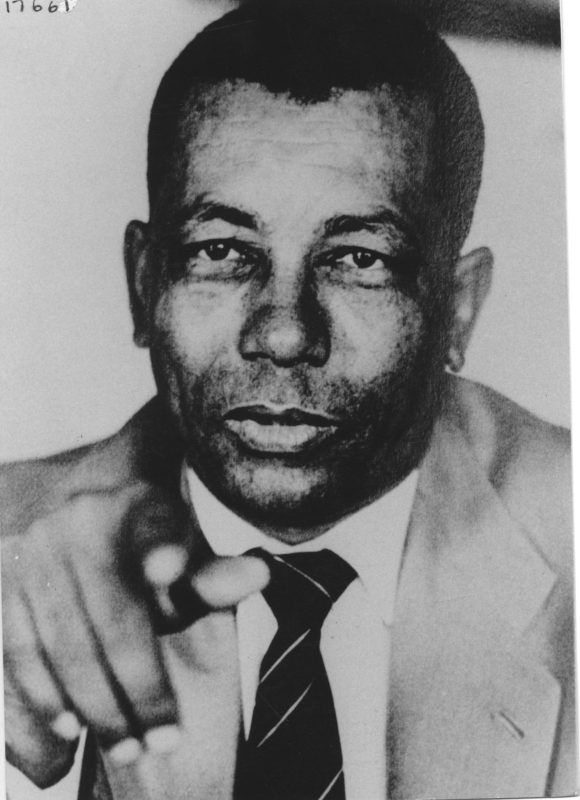PIONEER
Walter Max Ulyate Sisulu

Human rights activist | ANC Youth League co-founder | ANC Deputy President
Born: 18 May 1912 Died: 5 May 2003.
“The people are our strength. In their service we shall face and conquer those who live on the backs of our people. In the history of mankind it is a law of life that problems arise when the conditions are there for their solution.”
Who is
Walter Max Ulyate Sisulu?
Anti-apartheid activist, member and leadership figure of the African National Congress (ANC), co-founder of the ANC Youth League (ANCYL), and politician.
Professions
and Roles
Anti-apartheid activist and ANC politician.
Best Known For
Leadership influence on the development of the ANC and co-founding the ANCYL, served 26 years on Robben Island.
Life highlights
- Sisulu worked at the Premier Biscuit factory in Johannesburg. He soon became active in the Orlando Civic Association and became the secretary of the Orlando Brotherly Society, a Xhosa cultural group.
- In 1940, Sisulu was fired from his job at the factory for organising a strike for higher wages. He joined the ANC.
- In 1944, Sisulu attended the ANC annual national conference in Bloemfontein as a delegate of the Orlando branch. Along with William Nkomo and Lionel Majombozi, Sisulu was responsible for mobilising and establishing a youth wing of the ANC.
- Sisulu was elected onto the executive committee of the newly established ANCYL in 1944.
- During WWII, Sisulu campaigned against black South Africans joining the army.
- Sisulu rose rapidly in the ANC ranks and became a member of the Transvaal executive, as well as secretary of the ANCYL. In 1949, he was instrumental in the adoption of the ANCYL’s militant Program of Action, and was elected ANC Secretary-General.
- Together with Yusuf Cachalia, Sisulu was appointed joint secretary of the Congress Alliance. They called for a national work stoppage on 26 June 1950 to protest against the apartheid laws.
- Sisulu took a central role in planning and advocating for the 1952 Defiance Campaign. He led a group of passive resisters and was arrested and imprisoned for a brief period before being served with the first of his many banning orders.
- In 1952, Sisulu was tried under the Suppression of Communism Act for his leadership role in the Defiance Campaign and sentence to nine months’ imprisonment with hard labour.
- Sisulu was re-elected ANC Secretary-General in 1952.
- In 1953, Sisulu spent five months touring China, the Soviet Union, Israel, Romania, and the United Kingdom. This trip convinced him to join the South African Communist Party (SACP) on his return – an important factor in cementing the relationship between the ANC and SACP.
- Sisulu was banned for six months but secretly continued his ANC work. He was part of the committee that secretly organised the Freedom Charter campaign and the Congress of the People in 1956.
- In 1956, Sisulu was among the 156 people arrested for High Treason. He was acquitted in 1961. During this time he was detained for several months in 1960 due to a state of emergency and placed under house arrest following the banning of the ANC.
- In 1961, Sisulu met with Joe Slovo, Nelson Mandela, and Govin Mbeki to discuss the formation of Umkhonto we Sizwe (MK), the ANC’s armed wing. He served as political commissar of MK with Mandela.
- In 1962, Sisulu was continuously harassed by police and arrested six times.
- In 1963, he was convicted of furthering the aims of the banned ANC. He was released on bail pending an appeal and placed under 24-hour house arrest. In 1963, he skipped his bail conditions and went underground at the SACP’s secret headquarters at Liliesleaf Farm in Rivonia.
- In July 1963, the farm was raided by police and he was arrested. He was held in solitary confinement for 88 days and charged in October. In June 1964 he was sentenced, along with the other Rivonia trialists, to life imprisonment on Robben Island.
- Sisulu was instrumental in developing the underground ANC political structure called the ‘High Organ’, which dealt with the daily concerns of prison life and maintenance of internal discipline.
- In 1989, Sisulu and the other Rivonia trialists were released from prison after 26 years.
- Sisulu formed part of the ANC delegation that met with representatives of the government at Groote Schuur, Cape Town in May 1990.
- In 1991, Sisulu was elected as the Deputy President of the ANC.
- After retiring from politics in 1994 due to ill health, he devoted his time to the Albertina Sisulu Foundation.
IN THE WORDS OF OTHERS
“It was Walter’s course that was at the heart of all our education. Many of the young ANC members who came to the island had no idea that the organisation had even been in existence in the 1920s and 1930s, through to the present day. For many of these young men, it was the only political education they ever received.”
– Nelson Mandela, in Long Walk to Freedom
“He held his own; he interacted with ease and without a trace of inferiority. He was attracted to each of us, yet he was the magnet that drew us all together.
That was his hallmark: an ability to attract and work together with highly competent and talented young men, a ready sounding board for ideas. He was a powerful influence who exuded respect for their talents and a born diplomat.
He was courageous and his quiet self-confidence and clarity of vision marked him out as a leader among us.”
– Nelson Mandela, 2003
